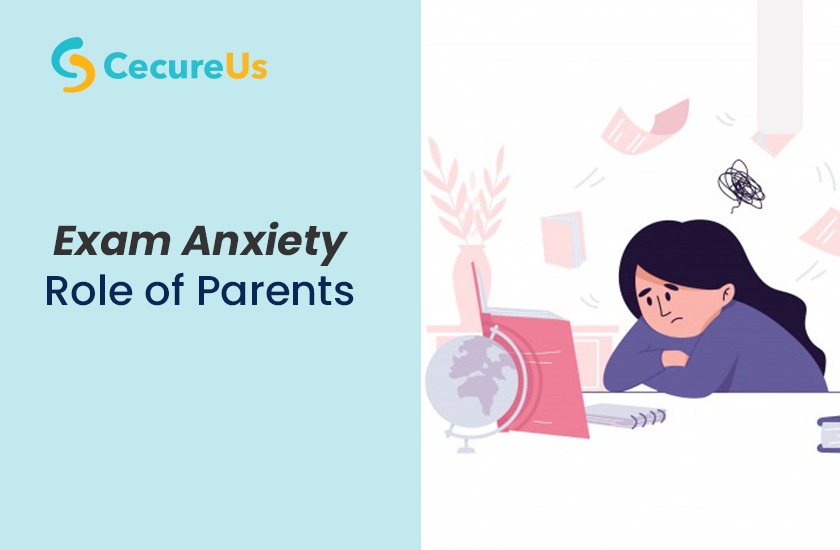
The tenth and twelfth grades act as a turning point in our children’s lives. At this stage, our children arrive at the crucial decision of which course or programs they would pursue to have a bright future. It is challenging for children and parents to cross this phase without obstacles owing to the quandaries and pressure to perform well. And it comes with its fair share of anxiety for our children.
Exam anxiety is a common problem faced by the younger generation these days. Just like organizational competition for employees, to some extent, this anxiety is contributed by the education system and the cut-throat competition for our children. But have we ever contemplated that, directly or indirectly, this exam anxiety is triggered in children primarily by parents?
In the webinar conducted by CecureUs, our expert psychologist and EFT specialist, Veena Jain, talks about the role of parents in tackling this exam anxiety in children and how parents can offer the needed assistance to support them.
To begin with, let us ask ourselves a few questions.
Are we, as parents,
- Teaching our children that it is OK to fumble/fail or equip them to handle their uncertain moments or failures?
- Conveying to our children the impacts of success and failure?
- Putting ourselves in their shoes and trying to understand their struggles?
- Do we accept our kids’ failures as much as we celebrate their success?
More often than not, parents fail to accept that, just like fumbling employees striving to climb to the top of the corporate ladder, children can be unsuccessful in their attempts, especially when it comes to their own. They project their anxiety, insecurities, and dreams on their children and presume them to live and fulfil their expectations, and in this process, parents forget their actual cognitive capabilities and aspirations.
What is test/exam anxiety?
Test anxiety is a physiological condition that makes people experience extreme anxiety, discomfort, or stress before or during an exam. And this anxiety is most common among those children who are top scorers rather than kids whose scores are average or below average. The main reason for test anxiety is that the top scorers are always met with high expectations from parents and teachers and, to some extent, relatives and friends. These children are not allowed to fumble at any point. This adds to the already existing pressure about the exams and leads to unexplained anxiety and stress.
Symptoms of exam anxiety in children
Test/exam anxiety in children could lead to physical, emotional, behavioural, and cognitive symptoms.
Physical symptoms of test anxiety manifest themselves in any of these forms.
- Rapid heartbeat
- Dryness in mouth
- Stomach ache
- Dizziness
- Frequent urination
- Headaches
- Low test scores
Some of the emotional symptoms that children show due to exam anxiety could be
- Unexplained fear, sometimes leading to hallucinations
- Disappointments that are difficult to overcome
- Anger on themselves and others
- Depression, sometimes accounting for suicidal thoughts
- Uncontrolled crying/laughing
- Feeling helpless/hopeless
Cognitive symptoms of exam anxiety in children are
- Racing thoughts that make it challenging for the child to concentrate on chapters
- Going blank before or during an exam
- Negative self-talk
- Dipping self-confidence
Behavioural symptoms of test anxiety that children encounter are
- Aggressive or Submissive in their responses
- fidgeting
- Substance abuse
- Avoidance; retracting into their own cocoon
How parents contribute to test anxiety in children
- Expectations: either feeding thoughts that their children can perform well or discouraging them that they cannot perform up to expectations, leading to unnecessary anxiety. For instance, if their children try and fail, they push and plant ideas to achieve the impossible. On the other extreme, they convey that the child can never achieve the impossible. There needs to be a balance between expectations and the message delivered to their children.
- Thrusting their desires and unfulfilled dreams onto their children.
- Comparisons. Comparing children with one another leads to anxiety and devastating results. As parents, one should understand that no two children have the same cognitive skills, and comparing them will do more harm than good. The right way of comparison would be to make children perceive their progress on their own selves. This can be achieved by offering assistance through coaching programs. Absolute comparison between their old version VS their new version can be healthy. However, relative comparisons demotivate the child.
- Questioning their abilities instead of encouraging and motivating the children. By stating the sacrifices that parents have made for their children and the resources they provide, parents make children indebted to repay them by scoring high. This way of pulling down the child yields no results. Instead, it shatters their self-confidence and interest in achieving even short-term goals and causes anxiety.
- Critical evaluation.
How parents can help children surmount exam anxiety
Controlling test anxiety consists of three steps.
Preparation, attitude, and handling pressure.
Preparation: To tackle exam anxiety in the right way, children can follow the ABC pattern, where
A represents new topics/chapters, chapters that are not confident enough
B represents topics and chapters that are known but not thorough
C represents topics and chapters that are thorough.
Kids should work towards converting chapters from A to C gradually. But also, they should be conscious enough to not lower from C to A.
Attitude
Understanding a child’s attitude before the exam helps parents boost their confidence. If achieving this seems challenging for parents, they could avail the assistance of a psychologist through their organization’s employee assistance programs. If a child is satisfied with average grades, parents tend to judge and push them to achieve more. Talking with children to understand their perspective contributes to a clear mind for both parents and the child. It also raises their test percentage.
Handling pressure
In a corporate, employees go through tremendous pressure to deliver targets. But they can avail assistance through specific programs to surmount anxiety. Same way, Children should learn to manage stress before exams and not let exam anxiety take over. This can be done by enrolling them in confidence-boosting programs that can help them handle pressure. Sometimes, stress before an exam can act as a driving force and help kids prepare well. But, if it progresses to the point of distress, causing exam anxiety, it should be handled correctly.
Coping with exam anxiety
Parents can follow these simple steps to help their children cope with exam anxieties.
- Understand the child’s learning style.
- Engage in analysing your child’s test papers, help them understand where they have gone wrong, and encourage them with kind words.
- Develop the attitude ‘So What’
- Practice Pomodoro, a defined technique to prepare for the exams.
- Give the child adequate sleep.
- Keep track of their nutritional intake.
- Ensure the child is well hydrated.
- Help your child practice Yoga and Meditation for a calm mind.
As Albert Einstein rightly said, “Everyone is a genius. But if you judge a fish on its ability to climb a tree, it will live its whole life believing that it is stupid.”
Several coaching institutes have customized programs for the tenth and twelfth graders to offer needed assistance to cope with exam anxiety. Also, employees in an organization with employee assistance programs can avail the help of a counsellor to help their children cope with exam anxiety. These programs are a boon to both parents and children having a hard time in this phase of their lives.
To conclude, exam scores do not portray children’s brilliance or capabilities. Parents should act as a conscious driving force, be open to their child’s dreams, and help them achieve their aspirations.
Contact Us if you are concerned about yourself or a loved one. Book an Appointment? today or Call us. To receive updates about out webinars, subscribe to our newsletter. Visit our website for blogs, vlogs, and self-assessments on emotional wellness.




